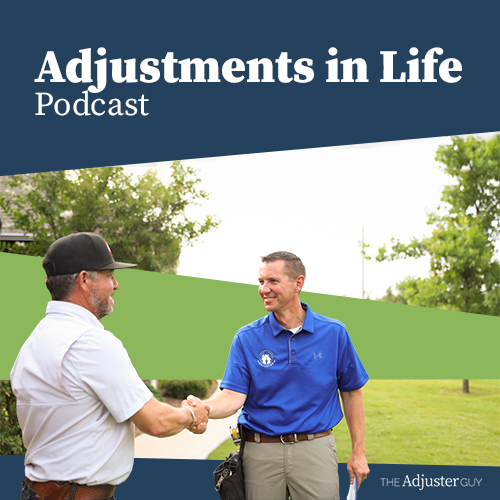Links
Kolbe Test: https://www.kolbe.com/kolbe-a-index/
Rick Roberson on LinkedIn: https://www.linkedin.com/in/rick-roberson-4380a817
Transcript
Alan: Alright, welcome to the show.
I have a special guest, today. I actually got to play a good part in training this gentleman—getting him started in this trade and so far I’m very pleased with the things that I’ve been able to see and know where Rick’s gone.
So, I will come on my guest today Mr. Rick Robertson.
Rick: Thank you, Alan, good to be here.
Alan: Alright, well I’m glad to have you. So, tell us kinda how you—what were doing before you got started in adjusting?
Rick: Well, I have spent—actually got 45-plus years, you know, in the workforce. In about half of that, I’m an ordained minister and spent about half of that time as pastor. But I’ve also spent an equal amount of time in the corporate world and went through the unfortunate, but common, experience of a forced retirement about four years ago.
The company I work for, we downsized about all we could downsize, and so we wound up just literally shuttering the place. And so, I was left with the reality of, you know, still young enough to want to do something and had to find something to do.
So, I spent a few years, you know, trying to get a consulting gig going. I guess, as you know, in my attempts to connect my son with you who was interested in the adjusting field, I began to ask myself the question “Well, that sounds like something I might be interested in” after some of our conversations.
That’s what led me to your doorstep, and I’m grateful for it now.
Alan: So tell us a little bit about how you came to the conclusion that you might be good at doing this.
Rick: Well, some of that was actually a result of my consulting business, because I have worked with people that really focus on trying to identify their natural strengths and talents and helping to get people in the right spot, doing the right things. It was in the course of that that I explored some of the—‘cause I use an assessment called the Kolbe Index to do that work—when I began to look at how my scores were with that assessment and look at what the insurance adjuster job required, I saw that I was actually a good fit for it, just in terms of my natural talents and instincts and so forth.
So that was, because I placed such a high regard for the Kolbe Index and what I’ve seen it be able to do for people, that was really a source of great confidence for me, because I knew that I at least had the natural instinct to do the job. Of course, there was a lot of it that was going to be “yet to be determined,” you know, but that was I think the thing that kind of put me over the hump.
Alan: For those that are listening that may not know or have ever referred to it as the Kolbe Test, what can they reference that to?
Rick: Okay, well it basically is just dealing with how we naturally go about doing the things that we do—decision-making, problem-solving, getting our work done.
I’m one of those people that very naturally needs a high amount of detail and information whenever I’m going about the problem solving process. That means I also do a lot of research and so forth—paying attention to detail.
It was that thing, probably more than anything, that I as I begin to think “Well, I think this is what the adjuster jobs going to require—being able to really hone in, identify specific things, pay attention to detail, and all of that” that I thought “You know, that’s going to be very suited to the way I’m wired.”
I will say everybody obviously is not wired like I am; and it doesn’t mean that you got to be exactly like me to do this job. But it’s like any job some people are going to be more suited than others.
Alan: Absolutely, and I think that test reverts or follows along the lines of another testor that was highly used in the NFL, is that correct?
Rick: Yes, well actually, it’s the founder of the Kolbe index, her father was the one who developed the Wonderlic. Kathy Kolbe is the person who developed the Kolbe Index, and it was her father, Mr. Wonderlic, who—that’s not his name, it’s escaping me at the moment. But anyway he’s the one who developed the Wonderlic Test and it measures more cognitive side of who we are, what we know, our aptitude, and that kind of thing.
Alan: Okay, it might be worth any adjuster out there, that hasn’t taken that test, how could that test help them? Would it help them to learn the characteristics that they are naturally do in order to assist them to be a better adjuster?
Rick: Yes, very much so. For one thing, it will identify areas that are going to be natural stress points. In other words, it made really be pinpointing why it wouldn’t be a job for them.
But on the converse side of that, once any of us know what we, what these natural strengths and abilities are, then I think it’s just a huge confidence builder, you know, in terms of launching us into new things. Especially for me, I’m not the kind of guy that takes a lot of risk and the Kolbe helps to identify those kind of things. So that fact that I just knew that I was suited for this helped me to take that step I might not have taken otherwise.
Obviously that would help anybody who might be on the fence, or whatever.
Alan: Do you mind telling your age?
Rick: No, I don’t at all. I’m 67 years old.
Alan: Alright 67, so it really doesn’t matter what age. I mean 18 to 80–if you have an interest to do this and you think you might have the qualities to jump in and go, by all means don’t be afraid.
Rick: That’s exactly right. One of the reasons I’ve been so grateful for it is it’s really giving me you know people who may not have gone through what I went through. You know, you go through a lot of soul-searching I guess, so to speak, whenever you weren’t ready to quit working.
All the sudden, you find yourself in that place and the reality is, for people my age, the job market is not always very receptive, you know. They look at us more on the downhill side of things; and I knew I had a lot of productive years left at least as far as I could see.
It was just a new lease on life for me quite honestly.
Alan: You’re coming into the field property side, which there’s still many years of opportunity on the more my lower level—I wouldn’t really say lower level, but more of an office or desk position where you don’t have to climb on the roof.
So even though your age may restrict you on this side of adjusting, there’s a lot more opportunity out there without having to get on the roof that you haven’t even explored yet.
Rick: And that’s one of the things I’m, you know, long-term still looking at. I’m grateful for the fact that right now I am able to handle the physical demands—which I will say I was a little surprised by those—but that being said, I have found myself to be up to the task. I enjoy that very much and want to continue to do as long as I can.
But, with that being said when you are my age you never know when health issues or things like a that can all of a sudden cut those things short. So I am definitely looking at the possibilities, down the road when I can’t do that any longer, having another outlet to still utilize the skills that I’ve learned.
Alan: And you’re still just scratching the surface right now. I mean by the time you have enough credibility and enough years into the industry to work flood—now you’re not even getting off the ground anymore.
So there’s still a lot more opportunity ahead in this career that you’ve only scratched the surface.
So once you got started—we certified you last January— was it everything you expected it to be? Was it not what you expected to be? Was there a lot of surprises once you’ve got started?
Rick: Well in one sense, no, because you did an excellent job just in the course of our licensing class to give us a least a respectable idea of what we were going to be facing. So with that said, no, I can’t say that I was alarmingly surprised.
There were some things that I know, as you know, it’s one thing to talk about about them and another thing to experience them. I guess most of my stuff would be actually once I got into the field, there were some areas there that I don’t know that I fully understood the magnitude of what those were going to be.
Something as simple as climbing on a roof. Okay, we knew we were going to have to climb on a roof; but you get an 8/12 pitch and all of a sudden, again at my age, it was a little bit more than what I anticipated. But again I managed it just fine.
One of the big things was realizing very early on that it was one thing to get my license it is another thing to learn how to be an adjuster.
Alan: Absolutely, absolutely.
Rick: I’m the kind of guy that thinks “Okay, I’ll go take this class and then I’ll be qualified” you know. And I’m not saying that just about adjusting; but that’s just how I approached things. I like to get certifications in all of those kind of things—the more credentials I can get I like, you know.
But it was that realization that actually getting out there and learning how to do what we needed to do, that was somewhat of an eye opener because then I realized I got a lot to learn.
Alan: On the teaching side of that, I can teach you everything you need to know; I can tell you what to do on every inspection; I can give you a list that’s going to teach you and show you what model to follow, but you’re going to hit obstacles when you get there you that aren’t going to be on that list.
It just takes getting out there. And, for the listeners, some people will get the opportunity and some people will wait longer to get the opportunity. If you wait long enough, everybody gets the opportunity.
But in that time when you’re not getting the opportunity, it’s not much more investment to continue to learn. I stress a lot in every certification that I do just a few more days of additional training or schedule a ride-along with anybody—reach out to anybody you know anywhere you can get and try to get that time out there. That time with another adjuster, learning their system, or learning my system is priceless.
That’s going to get you more inside in the shortest period of time by obtaining that. And it’s not as easy for some people as it is others.
Rick: I will say, I would encourage anybody who is listening and chooses to move forward with this career. As you know, again you were gracious enough to allow me to spend time with you before, in the field; and I can’t tell you how big a deal that is.
I would just encourage anybody to do everything that they could to get some sort of apprenticeship, for lack of a better word, because that helps you to do some good learning without assuming all the responsibilities.
Alan: Some people have the ability to get that for free, some don’t. In the large spectrum of adjusting, paying for that little bit of time of learning pays you back tenfold.
Rick: It does; it’s huge. And that’s what you know—course you gave us a lot of good input in that regard.
And I just know that there are a lot of opportunities out there if someone is willing to to do the work and take advantage of them. Even what you say, even if it costs you some money to do it, man, it’s just it’s a priceless thing for me.
Alan: I’m somewhat of an entrepreneur myself outside of adjusting and outside of The Adjuster Guy and into several different businesses that I’m operating. I continue to tell everybody, there’s no job, no business that I found outside of this one that you can put such a small investment forward and have such a large returned once you get established.
Rick: That’s true.
Alan: It takes time and not everybody gets an immediate opportunity to get out there. But once you get that opportunity, if you perform and you don’t—in today’s adjusting you don’t have to be a top-notch performer, you just have to be able to perform—and if you can perform, you’re going to make it, you’re going to get somewhere.
You mentioned your son Rhett, he got to certify the same class as you did. He was a little bit slower to get started, but once he got the call he went ahead and went.
Rick: He did.
Alan: I believe that was the deployment for Hurricane Laura, and Rhett is still working today. He got thrown into a very difficult situation, had to learn a lot really fast with no help whatsoever, by the skin of his teeth pulled it off the first month, and that’s what earned him his stripes.
He’s still going today. Man, I’m so proud of that guy right there because he pulled through a tough situation.
Rick: He did that, and I don’t know how many times—‘course he and I have maintained close contact throughout that whole experience—and I can’t tell you how many times something along these lines were said, “Well, you remember Alan said that this was how it was going to be.”
So he just takes me back again to class with you and our licensing in class, and how much you went beyond just the nuts and bolts of passing the test and gave us a lot of great insight and heads up about what we were doing to expect in the field.
And Rhett, you know my experience thus far has been relegated to the day claims and so forth. So I haven’t had the opportunity to go work a storm like he has, but man, it just sounds like everything he walked through was just verbatim the things that you laid out for us.
Alan: I think it was probably a little rougher than what I described to be honest with you. He did get thrown into one of the worst situations possibly you could have been thrown into; but again he pulled through really well and is doing extremely good.
I actually did have the opportunity to go back and work with him on that location again. And they brought me back in as a trainer; and I got to work with him again.
But at that point there really wasn’t much training left to do. He had jumped in with both feet and gone for it. And it worked out.
Rick: Well you told us over and over again that—and it is really important that our listeners hear this—you told us “if you want to work, there will be opportunity to work.”
But it’s work, if you’re willing to pay your dues you know get out there and get with it, there’s just there’s no reason why you can’t work if you want to.
Alan: If it wasn’t a good gig everybody wouldn’t want to do it. So it’s a good gig, it’s a good job.
There’s a lot of pros to it. As you move through the years, the cons of it start to hit you harder at times. I know I don’t enjoy being out on the road as much as I used to; but that comes with time. You spent a lot of years out on the road traveling and it kind of wears on you like any other job would.
But it still produces really well for me continually, and I wouldn’t—if I can go back and start over, I would do the same thing. It’s been really enjoyable.
Rick: Back to your question about the expectations I think fits in here, probably one of the areas that I didn’t fully grasp is just the workflow itself—the ebb and flow of that. It’s the chicken one day, feathers the next kind of deal.
Obviously, particularly as you’re relating to the catastrophe stuff, you guys are getting out there and going full bore for you know several weeks—if not months—and then all of a sudden it’s over.
I know one of the weeks where I had a bunch of claims in one week, what I was surprised about was the adrenaline rush that came with that and the letdown that I experienced when it was over. I wasn’t really expecting that I don’t think.
So I’ve been learning, you know, I spent most of my life in a sense punching a clock in—I’m a 8 to 5 kind of guy—and so this has been a new experience for me in that regard. Because again, some weeks can be pretty intense and then I might go a few weeks without anything at all.
Just learning to adjust to that and go with the ebb and flow of that it’s been a thing for me.
Alan: And you’ll notice overtime that, especially if you’re going to stay in the day claim zone of adjusting, as you build your business at home, it tends to start getting a little more even flow claims. I mean every claims position is based off of volume.
But as you grow start working for multiple companies, it appears that one company will pick up the slack when the other one’s a little bit low. It kind of rounds out.
You may have weeks that are slow, but eventually it’ll pick back up and you’ll get a continuous flow of claims.
Sa far and I think I know the answer to this, but is there anything that you regret about getting into the field of adjusting?
Rick: No, not at all—except not doing it sooner. that would be it.
I do want to say, it’s like any job. It’s got its drawbacks. It’s got its areas that you would say “this is the negative part of the job.”
And everybody is going to be different in this area because, for one thing, we have to deal with people. This is more than just going out and inspecting a roof or whatever. We are engaging with the public as well. Some people deal with that better than others.
And for me, there’s travel involved.You know, I might go several hours one way. In fact, there’ve been a lot of those I spent more time on the road than I did actually on sight.
For me, that’s not a problem. I enjoy that, but somebody else that time doesn’t work. So it’s just coming in, I think— and again you did a great job with this—I think the more can people just know what they’re walking into and that it is work, but it can be very rewarding work and enjoyable work.
Alan: Exactly. I’ve always looked at it—or i feel like i look at it and say here’s one of the things i do like about it that always kept me going was one sense, you’re the person that steps in and saves the day when everything has gone wrong. It doesn’t always work out that way. Sometimes you’re the enemy when you walk away.
But, in most of the claims that you handle somebody’s had an issue and you’re the guy that’s there to fix it for them. And they thoroughly respect that in you.
Before we got too far away from it though I got sitting here thinking and we were talking about being gone and what to expect. I had a guy tell me one time that the two best feelings you’ll ever have in your career as an adjuster is the day you deploy somewhere and the day you get to go home.
In between is always a blur, but you’re always excited the day you get to deployed because you’re either going somewhere you haven’t been or somewhere you haven’t been in a while. Then it’s kind of a drag while you’re there ‘cause you get burned out and tired. And when you get that call and you’re going home and you’re all excited.
Rick: I can see that and you hit on another, what is for me a great positive, in that is the variety that is, when you’re doing this kind of work, you really don’t know what you’re going to see all the time. I mean, there’s some things that you know a hail claim is a hail claim; but there’s still variations within that.
You don’t know where you’re going, get to see places, meet people, all those kinds of things. I love that variety of it I guess. It’s been a real plus for me.
Alan: I worked for a manager that lives in San Antonio and is a super good guy, really easy to talk to, great manager; and just in conversation with him, you know, we get to the point where you never know where you’re going or who you’re going to run into. He had actually been the personal—not a public adjuster—but a personal claims adjuster for the last 25 years for George Strait.
And the reason that was is because whoever George Strait had been insured with at the time of the loss, they sent Jim out to look at the loss. And they struck up a conversation, they got along real well, Jim handled the claim very well. So because George Strait is George Strait he was able to tell the insurance company who was going to handle his claim from that point on.
So from that point on, it didn’t matter who the carrier was.
Rick: How many people have their own personal adjuster?
Alan: That’s right—that isn’t a public adjuster!
Okay, so one last thing that I’d like to throw out there or for you to answer for me. I ask this to everybody that comes on the show with me, because I think everybody in their life has been given a solid piece of advice that probably carried with them year after year after year. And in most cases, with something that probably they stood on and it helped make them who they are.
If there was one piece of advice that you were given in your life that you think helped build you into the man you are today or what you do today, what what would that have been and how did it impact your life?
Rick: Well that’s a good question. I might have to think on that some—throwing me a curve. I honestly, I don’t know that this is the most critical, but it actually. It actually does have to do with insurance. It actually does apply to being an adjuster I think.
When I got out of college, I went into the life insurance business. I was in that for about seven years; and I was in life underwriting training course. I never will forget our instructor told us one time—this was all in the context of selling the policy—he said, “Don’t say boo boo if boo will do.”
That has stuck with me and he was trying to emphasize the point that, say what you need to say and shut up basically.
so I have used that many many times in a lot of different situations; but even now, doing what we do now, when you go out you know in some instances you have the authority from the carrier to settle that claim perhaps say whatever needs to be said on the spot when you’re dealing with the policyholder. But then there’s other instances where you don’t have that authority; and you’re just there to record the damages and submit report.
One of the things that I found is the policyholder is always wanting to know what you think, you know, and what you found and all of that. So that old adage of “don’t say boo boo if boo will do” has kind of continues to come up, because I have to remind myself, you know, I just don’t need to share that little bit of information.
Alan: That’s right. Sometimes that other can of worms needs to be left sealed. Don’t get involved in that.
Well Rick, I really appreciate you joining today. I think this has been a great conversation. I think it’d be good to do this continually, now and then. I’d like to keep everybody updated on your status as you continue to grow through the business. And continue to give them insight. You know, not just—I can have a lot of success stories on here and people that have been in it for years, but somebody new needs somebody relatively new to give them insight as well and
Rick: I would love to do that.
Alan: Well, alright. I appreciate it.
Rick: Thanks for having me.
Alan: Guys, that’s it. See y’all on the next episode and everybody be safe out there.





